(1).jpg)
HOW DID THE SUPERPOWERS ACHIEVE THEIR GOAL? THE BACKGROUND OF THE ABOLITION OF THE CALIPHATE
The abolition of the sultanate in 1922 was intended to ensure that political authority was exercised solely from Ankara. Mustafa Kemal, aware of his prestige in the Islamic world, was in favor of maintaining the caliphate. This was a trump card that would strengthen Türkiye’s hand in global politics. It was also a bond that would connect non-Turkish elements to the center. During the Turco-Greek War, captive Muslims had funneled money to Ankara; even İş Bankası (İş Bank) was established with these funds.
At first, Mustafa Kemal considered becoming a caliph himself, possessing both political and spiritual influence. This is why a pious image was projected until 1924. Those who look at the newspapers of the time would think that world Muslims were ready to pledge allegiance to Mustafa Kemal Pasha, whom they saw as a “hero who had won a victory against the imperialists.” When he realized this was not possible, he wanted to appoint either a compliant prince from the dynasty, such as Abdurrahim Efendi, or Sheikh Sunusi as caliph.
Said Nursi, Kurdish philosopher and activist, sympathizer of the Committee of Union and Progress, in a declaration he published in Ankara, saluted the deputies who abolished the sultanate with the words, “O Mujahideen of Islam and O People of Resolution and Authority.” He described them as individuals authorized to appoint and dismiss the caliph. He advised the Ankara parliament to assume the caliphate just as it had undertaken the spiritual identity of the sultanate. Thus, he not only accepted the abolition of the sultanate but also declared that he did not recognize Abdulmejid II as caliph (Tarihçe-i Hayat “History of Life”, 142).
The abolition of the caliphate had long been a desire of Britain, which ruled over Muslim colonies. The essence of the unofficial views expressed by Foreign Secretary Lord Curzon as early as May 1919 was as follows:
"The Turks must leave Europe. As long as the sultan remains in Istanbul, Muslims will keep their eyes on him. At the beginning of the war, Istanbul was promised to the Russians. Fortunately, the course of events later changed. If the sultan is exiled to Asia, he will be no more than an ordinary head of state in the eyes of Muslims, like the Shah of Iran. Istanbul grants him prestige. The straits should be open to all."
Curzon equated the sultan with the Turks. When he said that the Turks should be expelled from Europe, he was actually referring to the sultan. He also claimed that the Committee of Union and Progress was still active (Report to Lord Derby. British Library: India Office Records and Private Papers).
For this reason, propaganda was spread that caliphs should be from the Quraysh tribe. Arab scholars opposed this. Even the Khilafat Committee in India was under British control and supported the idea of an utopian Arab caliphate instead of the Ottoman caliphate, which suited British interests.
Meanwhile, a madrasa-educated deputy named Seyyid Bey presented a report in parliament titled The Shariah Nature of the Caliphate, arguing that the caliphate was not an Islamic institution but merely a form of state leadership. His speech was met with applause and astonishment in parliament.
That same year, a scholar named Ali Abdel Raziq was commissioned to write a book with a similar argument to thwart King Fuad of Egypt’s aspirations to maintain the caliphate. As a result, the scholars of Al-Azhar expelled him from the religious class.
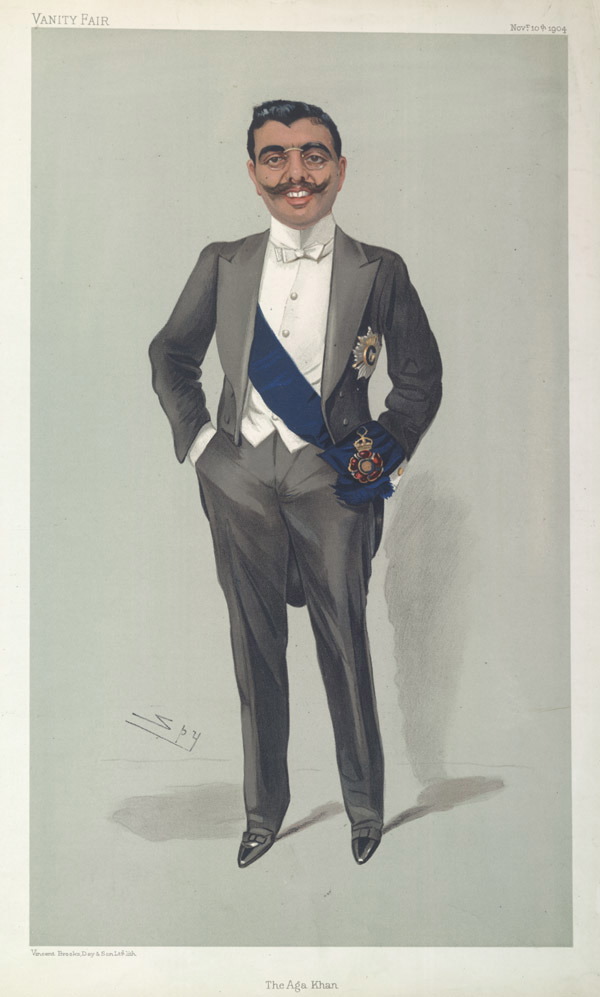
During the negotiations at Lausanne regarding capitulations and the status of non-Muslims, the abolition of the caliphate and Shariah law was brought up. The negotiations were suspended. İsmet İnönü returned to Türkiye and informed Mustafa Kemal of the developments when they met on a train in Eskişehir. They both decided on their abolition. This is explicitly recorded in the Lausanne proceedings. Now, it was just a matter of waiting for the right opportunity.
At this very moment, Aga Khan, the leader of the Ismaili sect—who was widely suspected of being a British agent—sent a letter to Ankara, as if he recognized the Sunni caliph as his sovereign, requesting that the political power of the caliph be strengthened. This letter was published in Istanbul newspapers, providing Ankara with the pretext it needed.
Lausanne was signed in July 1923. Ankara abolished the caliphate with a law dated March 3, 1924. Fearing public reaction, the entire Ottoman dynasty was exiled. The British Parliament ratified Lausanne only after this step was taken. Moreover, until October 1923, British forces had not yet vacated Istanbul.
This event, which caused great outrage in the Islamic world, prompted both King Fuad of Egypt and Sharif Hussein of Mecca to attempt to revive the caliphate in their own persons. However, due to the lack of approval from Muslims and the obstruction by the British, neither was successful. Even the Caliphate Council, which convened several times with representatives from the Muslim world, failed to reach a conclusion. Thus, one of the oldest institutions in Islamic history became a thing of the past.
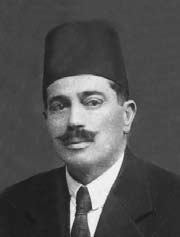
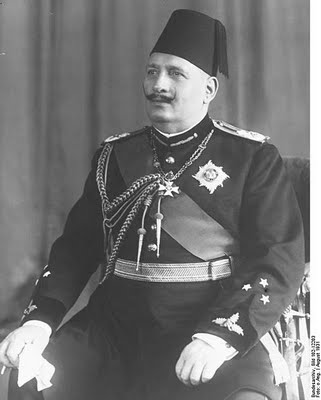
“If You Wish, You Can Even Restore the Caliphate”
In 1955, following the Democratic Party’s loss in midterm elections in 19 provinces as a reaction to central authority, deputies in the DP group pressed the government. Adnan Menderes, referring to the strength of the parliamentary group, made his famous statement to ease tensions: “If you wish, you can even restore the caliphate.”
In later years, different interpretations were attributed to this statement by various circles. Some even claimed that Mustafa Kemal, in his final days, had prepared a will to this effect, which was kept in Ziraat Bank, and that Menderes had spoken in this manner after seeing it.
The legal provision was as follows: “The caliph has been deposed. Since the caliphate is inherently included within the concepts of government and republic, the institution of the caliphate is abolished.”
If the caliphate was inherently included within the parliament’s spiritual identity, then the parliament, if it so wished, was also authorized to restore it. However, the actual meaning of the law was that the state would be governed by the government and there was no need for a caliph.
In 1924, Türkiye was still officially an Islamic state. The caliph was the head of the Islamic state, not a spiritual leader like the pope or the patriarch. In classical terminology, “He holds a sword in one hand and the Qur'an in the other.” He fulfills Islamic rulings as the deputy of the Prophet. Therefore, the head of a secular state cannot be a true caliph.
If the parliament is capable, it can restore the caliphate by amending the constitution. For this, there is no need for the clause in the law. "The laws that abolished the sultanate and the caliphate and declared the republic were essentially constitutional amendments. For these to be valid, they required the approval of two-thirds of the parliament. However, this was not the case, meaning that the law was invalid from the very beginning."
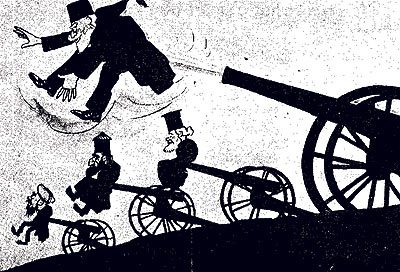
A cartoon depicting the abolition of the caliphate. It also shows leaders from other religions being expelled, but in reality, they all remain in place.
During his visit to Türkiye, Bill Clinton emphasized the drawbacks of the absence of a caliph for the Islamic world and hinted at the possibility of reestablishing this institution in Türkiye. From time to time, British and American intelligence agencies leak such projects to the media to gauge public opinion. Even the aforementioned will may have been fabricated to appease those accustomed to attributing everything to Mustafa Kemal.
This initiative, which is also a part of the Greater Middle East Initiative, requires the emergence of a Sunni candidate in Türkiye who aligns with the caliphate tradition, possesses broad acceptance, has diplomatic influence over the entire Islamic world, and holds symbolic charisma. What the superpowers desire is a symbolic caliphate that will serve world peace (i.e., help keep the Islamic world under control). Whether it is a member of the Ottoman dynasty or a figure who has gained prestige in the Muslim world, the revival of this grand tradition, even in a limited capacity, is expected to inspire confidence and hope within the Islamic world and contribute to global stability.
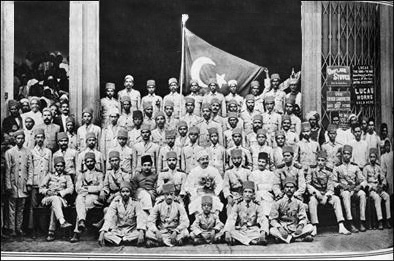
Indian Khilafat Committee, Bombay, 1920s
Önceki Yazılar
-
THE WATER OF IMMORTALITY IN THE “LAND OF DARKNESS”28.01.2026
-
THE WORLD LEARNED WHAT FORBEARANCE IS FROM SULTAN MEHMED II21.01.2026
-
THE RUSH FOR GOLD14.01.2026
-
TRACES OF ISLAM IN CONSTANTINOPOLIS7.01.2026
-
WHO CAN FORGIVE THE KILLER?31.12.2025
-
WHEN WAS PROPHET ISA (JESUS) BORN?24.12.2025
-
IF SULTAN MEHMED II HE HAD CONQUERED ROME…17.12.2025
-
VIENNA NEVER FORGOT THE TURKS10.12.2025
-
THE FIRST UNIVERSITY IN THE WORLD WAS FOUNDED BY MUSLIMS3.12.2025
-
WHO BETRAYED PROPHET ISA (JESUS)?26.11.2025